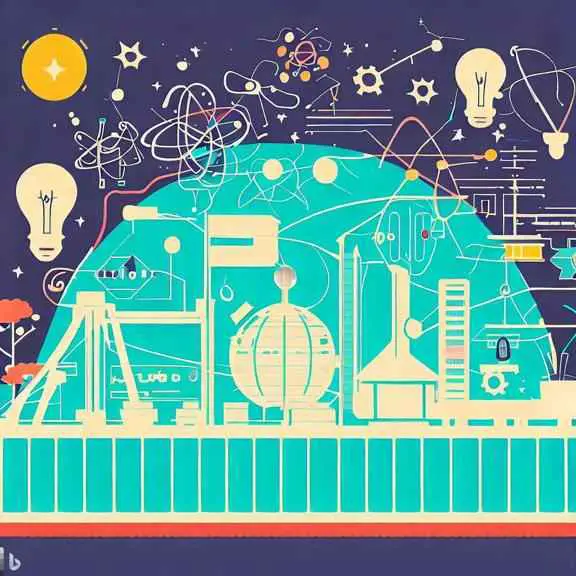Paragraph on
Science Fair
for all Class, Words
by Education on
A science fair is an event where students showcase their scientific projects, experiments, and inventions. This event encourages students of…, please continue reading.

Table of Content
Ad
The Paragraph on Science Fair
Ad
A science fair is an event where students showcase their scientific projects, experiments, and inventions. This event encourages students of all ages to think creatively and apply scientific concepts to real-life problems. It is a platform for students to explore and experiment with various scientific concepts, theories, and ideas. Science fairs offer a unique opportunity for students to learn, be curious, and inspire their passion for science, technology, engineering, and math (STEM) subjects.
Participating in a science fair is a great way for students to develop scientific skills, such as observation, hypothesis testing, data collection, and analysis. It helps to enhance analytical thinking, communication, and problem-solving skills. Additionally, students get an opportunity to interact and communicate with their peers, teachers, and experts in the field. They also get feedback and suggestions from the judges that help them improve their projects and presentation skills.
Science fairs offer a range of project ideas that can be selected based on the student’s interests, grade level, and scientific knowledge. For instance, students can conduct an experiment on the effects of different types of soil on plant growth, explore the properties and uses of magnets, build a simple electric motor, or demonstrate the working of a water filter. Along with traditional projects, there are several innovative and unique ideas that the students can explore, such as developing an app to track carbon footprints, building a solar-powered car, or researching the effects of mindfulness on mental health.
In conclusion, science fair is an excellent opportunity for students to explore and learn about science, technology, engineering, and math. It not only helps students to develop scientific skills but also enhances their communication and problem-solving skills. It ignites their curiosity and encourages them to think critically, creatively, and innovatively.

Questions about Science Fair
Ad
Questions and Answers:
Q1. What is a science fair? A1. A science fair is an event where students showcase their scientific projects, experiments, and inventions.
Q2. What skills do students develop while participating in science fairs? A2. Students develop scientific skills such as observation, hypothesis testing, data collection, and analysis. It helps to enhance analytical thinking, communication, and problem-solving skills.
Q3. What is the importance of science fairs? A3. Science fairs offer a unique opportunity for students to learn, be curious, and inspire their passion for science, technology, engineering, and math (STEM) subjects.
Q4. Can students of all ages participate in science fairs? A4. Yes, students of all ages can participate in science fairs.
Q5. What kind of projects can students do for science fairs? A5. Students can conduct experiments on a range of topics such as plant growth, properties of magnets, or the effects of mindfulness on mental health. They can also develop innovative projects like building solar-powered cars or developing an app to track carbon footprints.
Q6. What are the benefits of participating in a science fair? A6. Participating in a science fair is a great way to develop scientific skills and enhance analytical thinking, communication, and problem-solving skills.
Q7. Is there an entry fee to participate in science fairs? A7. It depends on the event. Some science fairs may have an entry fee, while others may not.
Q8. How do students get feedback on their science fair projects? A8. Students get feedback from the judges who assess their projects based on various criteria.
Q9. Can students work in groups for science fair projects? A9. Yes, students can work in groups for science fair projects.
Q10. Can science fair projects help students in their future career? A10. Yes, science fair projects can help students develop skills and knowledge that are useful in their future career.

Vocabulary related to Science Fair
Ad
Vocabulary Words:
- Hypothesis: A supposition or proposed explanation that is made on the basis of limited evidence as a starting point for further investigation.
Usage: The students developed a hypothesis that certain plants grow better in sandy soil after conducting the experiment. Synonyms: theory, premise, postulation Antonyms: fact, reality, certainty
- Analytical: Relating to or using analysis or logical reasoning
Usage: The analytical skills developed while working on the science fair project helped the student to do well in his math class. Synonyms: logical, reasoning, systematic Antonyms: illogical, irrational, unreasonable
- Innovative: Introducing new ideas; original and creative in thinking
Usage: The student’s innovative project of developing an app to track food waste won the first prize in the science fair. Synonyms: original, creative, inventive Antonyms: conventional, unimaginative, routine
- Communication: The imparting or exchanging of information or ideas
Usage: The science fair provided an opportunity for students to enhance their communication skills by presenting their ideas to the judges. Synonyms: interaction, dialogue, correspondence Antonyms: miscommunication, silence, inhibition
- Platform: A raised level surface on which people or things stand
Usage: The science fair provided a platform for students to showcase their projects and ideas to the wider audience. Synonyms: stage, podium, stand Antonyms: ground, floor, basement
- Curiosity: A strong desire to know or learn something.
Usage: The science fair sparked the student’s curiosity to explore more about the topic of renewable energy. Synonyms: inquisitiveness, eagerness, interest Antonyms: indifference, disinterest, unconcern
- Demonstrate: Show or prove something by giving evidence or a convincing explanation
Usage: The student demonstrated the working of the water filter through his science fair project. Synonyms: show, exhibit, display Antonyms: conceal, hide, obscure
- Passion: A strong and barely controllable emotion
Usage: The science fair ignited the student’s passion for science, and he decided to pursue a career in the field. Synonyms: zeal, enthusiasm, ardor Antonyms: apathy, indifference, lethargy
- Evaluate: Form an idea of the amount, number, or value of; assess
Usage: The judges evaluated the science fair projects based on various criteria, such as scientific method, creativity, and presentation skills. Synonyms: assess, analyze, judge Antonyms: ignore, neglect, underestimate
- Innovative: Introducing new ideas; original and creative in thinking
Usage: The science fair provided a platform for students to showcase their innovative projects and ideas. Synonyms: original, creative, inventive Antonyms: conventional, unimaginative, routine
- Experiment: A scientific procedure undertaken to make a discovery or test a hypothesis
Usage: The student conducted an experiment to explore the effects of different types of light on plant growth. Synonyms: investigation, trial, test Antonyms: conclusion, opinion, theory
- Interaction: The process of engaging with others to exchange information and ideas
Usage: The science fair provided an opportunity for students to interact with their peers and experts in the field. Synonyms: communication, cooperation, engagement Antonyms: isolation, alienation, estrangement
- Innovative: Introducing new ideas; original and creative in thinking
Usage: The student’s innovative project of developing an app to track carbon footprints was appreciated by the judges. Synonyms: original, creative, inventive Antonyms: conventional, unimaginative, routine
- Perception: The ability to see, hear, or become aware of something through the senses
Usage: The science fair project helped the student to develop a better perception of the properties of magnets. Synonyms: awareness, understanding, comprehension Antonyms: unawareness, ignorance, misunderstanding
- Explore: Travel in or through an unfamiliar area in order to learn about it
Usage: The science fair provided an opportunity for students to explore new ideas and topics related to science and technology. Synonyms: investigate, examine, research Antonyms: ignore, disregard, neglect

Structure of the sample "Science Fair" paragraph
Ad
Cohesion and Coherence:
The paragraph on science fair follows a logical flow of ideas that are connected through cohesive devices such as transition words (for instance, additionally, in conclusion) and pronouns (it, they). The paragraph maintains coherence by focusing on one main idea - the importance of science fair in promoting scientific skills and enhancing students’ passion for STEM subjects. The paragraph provides relevant information and examples to support this idea and has a clear introduction, body, and conclusion structure. Overall, the paragraph displays good cohesion and coherence.
